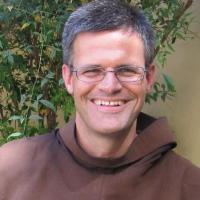Commentary on Habakkuk 1:1-4, 2:1-4
Our reading from Habakkuk concludes with words that had a profound influence on New Testament writers. The reader hears the observation that the righteous live by faith. We can see in this complicated reading drawn from two different chapters within Habakkuk that faith does not consist of blind obedience, but rather it is a call to discernment and dialogue, which leads to trust in God.
The book of Habakkuk describes a difficult time within the life of Israel. Although we cannot be sure of the time when it was written, it certainly describes a setting that is not unlike the Fall of Jerusalem (587) and the subsequent Babylonian Exile. We can know very little about the prophet Habakkuk, but he serves as an intermediary between God and Israel. This passage depicts this role as Habakkuk is described as speaking in the first person repeatedly and then receiving an answer from God through a vision.
As is so often the case among the Minor Prophets, we see Habakkuk bring up the question of theodicy repeatedly. In 1:2, he wants to know: how long will he cry for help and God will not answer? He raises a similar problem in 1:3, “Why do you make me see wrong-doing and look at trouble?” These are difficult questions, which reflect an honesty in Habakkuk’s relationship with God. No questions are inappropriate. Habakkuk can only ask these questions if he has a trusting relationship with God.
Habakkuk reflects a traumatic episode that Israel faced, but the questions and complaints of 1:2-4 are rooted in the conduct of Israel before the Babylonian invasion. Habakkuk does not mince words. Part of a prophet’s job is to reflect on the world as it is rather than predicting the future, as is so often misattributed to prophets. Verse 1:4 demonstrates Habakkuk facing up to the challenges of his time. The one who lives by faith must encounter many others who choose to live by a different standard. The necessity of living by faith does not always produce a comfortable life. In fact, discomfort would seem to be the price of a meaningful life for the prophet Habakkuk. He tells us here that “the wicked surround the righteous … ” It is so important to see how biblical faith will challenge the Gospel of Prosperity. When we are in right relationship with God like the Prophet Habakkuk, we will not always find ourselves in our comfort zones. We will experience the discomfort of seeing much wickedness or feeling no support by challenging the status quo, feeling surrounded by wickedness.
The section between 1:4 and 2:1 makes explicit that God is going to use the Babylonians (biblical Chaldea in 1:6) to rectify the situation of injustice and violence that Habakkuk is lamenting in 1:2-4. In 1:16-17, Habakkuk complains bitterly about this remedy in which the cure appears to be worse than the disease. These verses describe a truly perplexing and disturbing situation of which the prophet cannot make any sense. While it is disturbing, it is probably not much more disturbing than many of our contemporary situations. In the past few years, we have seen extreme antisocial behavior answered by even more antisocial behavior. As Israelite society crumbles, no easy narrative emerges to explain it. God offers a vision rooted in the future to help Habakkuk sustain himself in the troubling and confusing present in which there is no relief.
We skip over many verses to get to 2:1, but there is a continuity to the reading. We can see Habakkuk persevering in his vocation. Rather than retreat to safer and more comfortable ground, Habakkuk vows to remain in his “watchpost” and “keep watch.” I believe this perseverance begs the question as to why this should be done. Discomfort should not be sought, but a meaningful life will find it. Habakkuk can delay his comfort and live into the questions that he is asking. We live in a time when our churches and society are asking many questions; we can attempt to answer them too quickly or even run away from them. These are the safe and comfortable things to do, but they are not the prophetic things to do. They do not witness to trust in God.
The end of the lection would seem to resolve some of the questions from the beginning of it. Habakkuk, and we readers as well, must be sustained by a vision from God. This is God’s answer to Habakkuk’s questions. While the vision is never articulated, it is something that will sustain Habakkuk in spite of the difficult things that he sees. I believe we can assume that this is a vision of a world in which Torah and justice prevail.
Although we await the fulfillment of this vision, Habakkuk 2:3 promises that fulfillment in the “appointed time.” When this verse was translated into Greek, it was translated as kairos time and 2:3 references the end of time. As we consider a vision of the end, it will be influenced by our understanding of the beginning. One’s eschatology should be influenced by one’s protology. Genesis 1 offers us a vision of blessing, goodness, and mutuality that must be part of any vision that will sustain us. We see no injustice or chauvinism within the vision of Genesis 1, and I believe this is the vision that sustains Habakkuk and us as we confront injustice and violence.
Habakkuk is rooted in reality. The proud still seem to be prospering at the end of this reading, but it is clear that they are not in right relationship with God. Habakkuk receives a saving answer in 2:2 that he has pleaded for in 1:2-3. Habakkuk must be sustained like Abraham and the prophets before him by a vision of the future and a promise of a kairos time to come. The proud are still there, but their pride and prosperity are neither in accord with the promises to come or the vision of true blessing, goodness, and mutuality from the beginning.


October 30, 2022